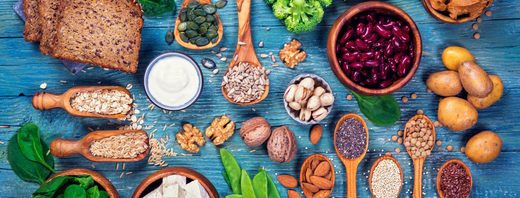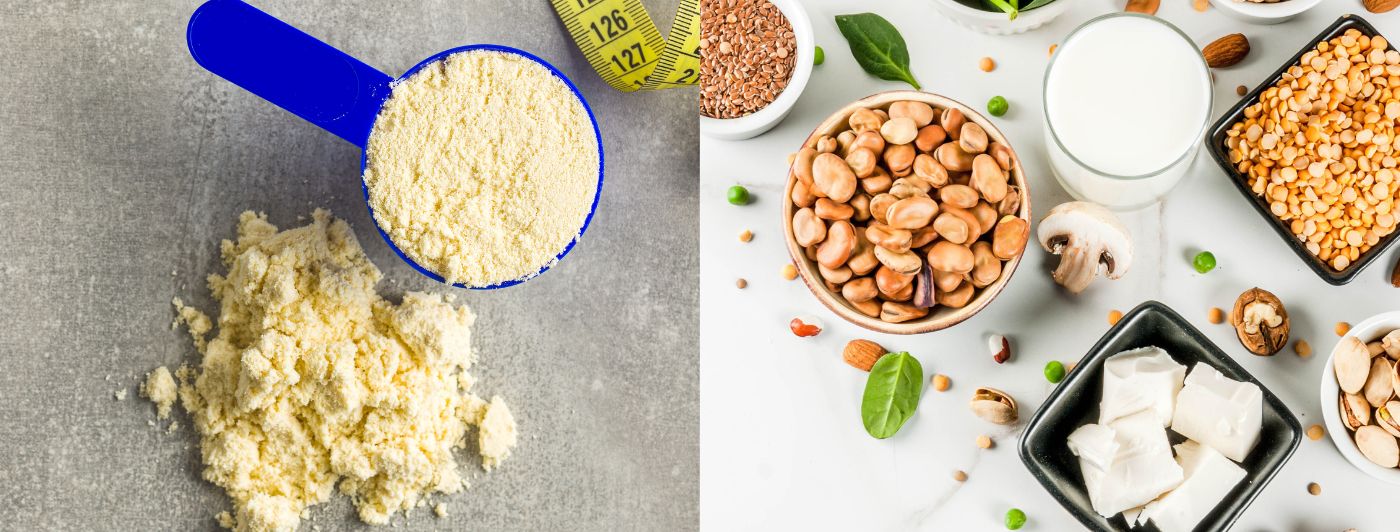Eating plant-based doesn't mean lacking in protein. These 10 delicious protein sources will give you a balanced meal and keep your body well-nourished to meet your daily protein requirements.
More people are choosing vegan or vegetarian diets, raising questions about getting enough nutrients like protein. The good news is, meeting your protein needs as a vegan is simple with a balanced approach.
To maintain this balance, it's important to avoid relying solely on processed vegan foods like frozen waffles and chips, which don't provide enough protein or other essential nutrients. Instead, focus on a variety of colorful fruits and vegetables, hearty grains, and filling potatoes to easily reach your daily protein goals.
How to Know if You Are Getting Enough Protein as a Vegan?
- Use a food tracking app to record what you eat for a few days.
- Check how much protein you're eating each day and see if it meets your target.
- For most people, aiming for 10% to 35% of your daily calories from protein is recommended.
- That's about 200 to 700 calories of protein for a 2,000-calorie daily diet.
If you discover you're not getting enough protein,
- Include more of the foods listed below in your meals.
- If you have specific needs like being pregnant or doing intense workouts, consider consulting a registered dietitian for personalized advice on tracking and boosting your protein intake.
10 Essential Vegan Sources for Daily Protein Requirements
Here's an extensive guide to top vegan protein sources, all free from dairy, eggs, and meat. You'll find familiar choices like beans and tofu, along with lesser-known options such as green peas and wild rice, which are also rich in protein.
1. Soy
Often associated with processed patties or mystery "meat" loaf, soy protein is a versatile part of a healthy plant-based diet. Tofu, tempeh, edamame, and soy milk are excellent options to boost your protein intake for your daily protein requirements. Try stir-frying tempeh or tofu, steaming edamame, or adding soy milk to your morning cereal.
According to a 2016 review in Nutrients, many health benefits of soy are linked to consuming 2-4 servings daily. Here's the protein content in common soy foods per the USDA:
- Tempeh: 17 g protein per 1/2 cup
- Shelled edamame: 9 g protein per 1/2 cup
- Tofu: 9 g protein per 3 ounces
- Soy milk: 7 g protein per 1 cup
2. Chia Seeds
A single tablespoon of chia seeds delivers nearly 2 grams of protein, making them a versatile addition to meals. They can be easily incorporated into breakfasts, sprinkled on salads and soups, or used to create a nutritious, protein-rich dessert. Additionally, due to their hydrophilic nature, chia seeds absorb water and expand when soaked for about 20 minutes, making them an ideal egg substitute in vegan recipes.
3. Tofu
Tofu is a versatile and nutritious plant-based protein source made from soybeans. It is coagulated soy milk that is pressed into solid white blocks of varying textures, from silken to extra-firm. Tofu is a complete protein, containing all nine essential amino acids your body needs to build and repair tissues. It's also a good source of iron, calcium, and manganese.
Here are some of the benefits of including tofu in your vegan diet:
- High in protein : A 3-ounce serving of firm tofu provides about 8 grams of protein.
- Affordable: Tofu is a relatively inexpensive protein source.
- Versatile ingredient: Tofu can be marinated, baked, stir-fried, crumbled, or blended to take on a variety of flavors and textures.
- Good source of nutrients: Tofu is a good source of iron, calcium, and manganese.
If you're looking for a delicious and nutritious way to add more protein to your vegan diet, tofu is a great option.
4. Whole Grains
Beyond carbs, whole grains are rich in protein, fiber, vitamins, and minerals. Start your day with oatmeal, enjoy quinoa salads for lunch, or try wild rice-stuffed peppers for dinner. Here's the protein content in cooked whole grains as per the USDA:
- Quinoa: 8 g protein per 1 cup
- Wild rice: 6.5 g protein per 1 cup
- Oats: 6 g protein per 1 cup
- Buckwheat: 5.5 g protein per 1 cup
5. Lentils
Lentils are an excellent source of protein and fiber, offering 18 grams of protein per cooked cup (198 grams). A single cup also provides over half of your recommended daily fiber intake. The fiber in lentils promotes a healthy gut by feeding beneficial bacteria in the colon and may help lower the risk of heart disease, diabetes, obesity, and certain cancers.
In addition to their fiber and protein content, lentils are rich in folate, manganese, iron, antioxidants, and other health-enhancing plant compounds. They are a great choice for meeting your daily protein requirements.
6. Green Veggies
Often underestimated for protein, green vegetables like spinach, Brussels sprouts, and green peas are nutritious additions to your diet. They're also rich in antioxidants, fiber, and low in calories. Add cooked spinach into pasta, mix green peas into curries, or roast Brussels sprouts for a crispy side dish. Here's their protein content per the USDA:
- Spinach: 5 g protein per cup
- Green peas: 4 g protein per 1/2 cup
- Brussels sprouts: 2 g protein per 1/2 cup
7. Peanut Butter
Yes, this pantry staple not only delights the taste buds but also serves as a valuable source of high-quality, plant-based protein. According to USDA data, two tablespoons provide 7 grams of protein. However, it's important to select healthier varieties and manage portion sizes diligently. The mentioned serving contains 180 calories, so while it's a nutritious protein source, excessive consumption can contribute to weight gain.
As for enjoying peanut butter, you likely already know many ways to savor it. This delectable spread makes for a perfect afternoon snack paired with apple slices. Alternatively, indulge in a nostalgic favorite by spreading it on whole-wheat bread with low-sugar jelly for a classic PB&J sandwich.
8. Sprouted Bread
Sprouted grain bread, such as Ezekiel bread, is a protein-rich option. Depending on the brand, each slice contains 4 to 5 grams of protein according to the USDA. Use it for sandwiches, toast, or in recipes like breakfast strata.
9. Potatoes
Despite their reputation, potatoes are nutritious. A large russet potato with skin contains 8 grams of protein, along with potassium and fiber. Enjoy them mashed, roasted, baked, or scalloped.
- Russet potato: 8 g protein per large potato
- Red potato: 7 g protein per large potato
- Sweet potato: 2.5 g protein per medium potato
10. Wild Rice
Unlike white rice, wild rice retains its bran, which is beneficial because the bran is rich in fiber and packed with vitamins and minerals. A cooked cup (164 grams) of wild rice offers nearly 7 grams of protein, along with substantial amounts of fiber, manganese, magnesium, copper, phosphorus, and B vitamins.
For those specifically looking to supplement their diet with protein powders, the Best Plant Based Vegan Protein Powder Company in India offers a variety of options that are excellent for muscle gain and overall protein intake enhancement.
The Bottom Line
Protein deficiencies are rare among vegetarians and vegans, especially when they maintain a well-balanced and healthy diet. However, some individuals might want to boost their plant protein intake for various reasons. This list serves as a helpful guide for those looking to add more plant-based proteins to their diet and find the best plant based vegan protein powder for muscle gain.











